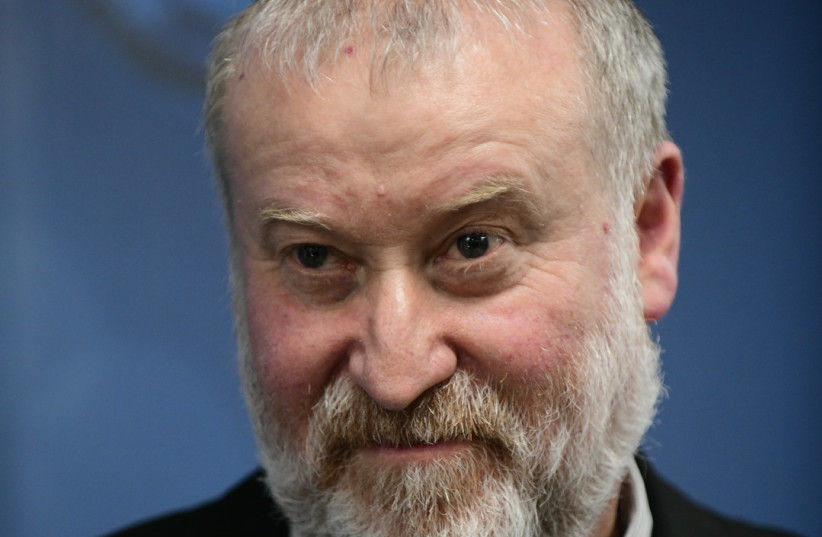Attorney-General Avichai Mandelblit closed the probe into police officers involved in the death of Ahuvia Sandak, who was killed during a high speech chase after he and others had allegedly thrown rocks at Palestinian vehicles and then tried to avoid arrest.
The case has been a major issue for Knesset MK Itamar Ben-Gvir and certain right-wing groups that regularly have altercations with the police. Ben-Gvir dismissed the decision as biased, calling for an external inquiry. However, the High Court of Justice rejected a petition last January by the right-wing activist group Honenu to alter the parameters that Mandelblit and the police set to probe the Sandak case.
Sandak was killed on December 21, 2020, when the vehicle he was in flipped over while he and the group of activists were fleeing from police. Police either accidentally collided with his car or purposely tried to force his car to stop.
Mandelblit said on Thursday that the evidence was not clear-cut on which narrative was true, but it was clear that Sandak and his fellow activists were dangerously breaking the law by fleeing arrest in a high-speed chase.
Without a definitive narrative, the most Mandelblit said he could do was order the police in their officer training to clarify what is allowed and what is not during different kinds of high-speed chases.
The attorney-general added that the recklessness of Sandak and his fellow activists’ acts of throwing rocks at moving vehicles, purposely circumventing a checkpoint in a dangerous way and weaving their car back and forth to make the police chase more difficult justified attempts by the police to try to pass them and cut them off.

In addition, the Justice Ministry distributed multiple videos relating to the incident, one of which showed that the police waited to try to pass Sandak’s car until the road was both straight and wide enough so that they even would have had room to safely pass a bus.
A three-justice panel, including some of the court’s most conservative justices, supported the police and Mandelblit’s approach of having the incident analyzed by two separate divisions of law enforcement.
Justices David Mintz, Yosef Elron and Yitzhak Amit ruled that law enforcement had been correct to probe criminal allegations against the Sandak-aligned activists via the Jerusalem District police unit, while probing allegations regarding Sandak’s death via the Police Investigations Department (PID), which is the unit that investigates allegations of police misconduct.
Honenu had argued that the entire investigation should be handled by PID, focusing on the police actions that allegedly led to Sandak’s death.
They had argued that involving the Jerusalem District police was an attempt to cover up police misconduct and deflect blame onto Sandak’s colleagues; and that furthermore, PID’s deputy director Moshe Saada had criticized his boss, the unit’s director Keren Ben Menachem, over her handling of the case.
The High Court did not accept Honenu’s claim, saying that the only way the probe could confront the complex realities involved is by involving the two separate police units and dividing responsibility for those parts of the incident where the suspects were solely civilians from the parts where there was potential police misconduct.
Honenu had initially obtained some preliminary support from a magistrate’s court judge last year who seemed critical of the police handling of the investigation.
But it appears that the High Court’s ruling eventually paved the way for Mandelblit’s decision.
Honenu lawyer Menashe Yaado accused Ben Menachem last January of trying to cover up alleged police crimes in Sandak’s death, while deputy state attorney Shlomo (Mumi) Lemberger accused Yaado of lies and defamation.
Evidence has indicated that Sandak was not the driver, and that he may not have been wearing a seat belt at the time, as the other four passengers were not badly hurt.
The police narrative was that the passengers in the car, a mix of minors and young adults, were throwing rocks at moving Palestinian vehicles and had even hit and harmed one Palestinian.
If the police had been too aggressive, they could have faced charges, whereas if the car flipping was an accident, or the circumstances cannot be determined, it may be that only Sandak’s co-activists will be charged for rock throwing and possibly dangerous driving leading to his death.
Honenu has not actively denied that the group threw rocks at Palestinian cars, but maintains that the police pursuit of Sandak and the others was far more dangerous and ended in greater violence than anything the activists might have done beforehand.
The more direct accusations against Ben Menachem also came after an extraordinary letter last year from Saada to Lemberger accusing Ben Menachem of violating proper procedure. Saada did not accuse her of a cover-up, but he did say that her decision to release the police involved in the incident only hours after they were brought to the station violated procedure.
Lemberger responded to Yaado saying that Ben Menachem’s decision was a professional one based on a standard legal analysis of the case.
He also said that releasing the police did not mean they were off the hook, and that if necessary, they could still be indicted or disciplined.
Mandelblit did not address the unusual decision by Ben Menachem to release the officers so quickly, seeming to focus on the dangerous circumstances created by Sandak and his fellow activists.
Saada himself had a long impressive career in the PID until Ben Menachem was appointed the unit’s chief.
The two have a fraught relationship, with Saada believing he should have been appointed PID director.
